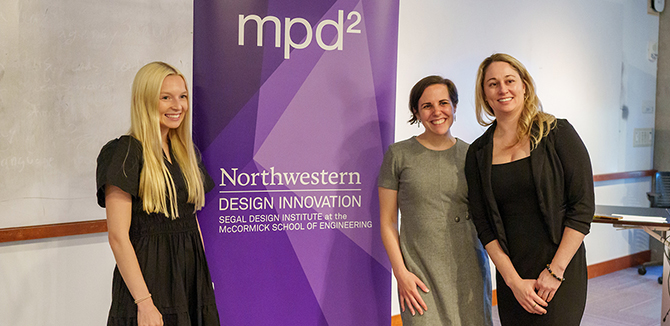Pivoting to Find a Care Companion
Three recent mpd² students reflect on their capstone experience and the journey they took to create a healthcare app geared toward caregiver communication.

The capstone project for Northwestern Engineering's Master of Product Design and Development Management (mpd²) program is designed to take students through the realities of creating a new product or service.
One of those realities is that sometimes, it's necessary to change direction — a reality Sarah Bennett (mpd² '24), Daniela Salonen (mpd² '24), and Emily Zarefsky (mpd² '24) learned firsthand.
The three began their capstone experience wanting to focus on women's health.
"We really wanted to do something for women," Bennett said. "We wanted to make them feel more empowered and seen and heard."
The team spent its first two quarters honing in on that concept and explored a combination hardware/software as a service model, but the product wasn't resonating. So with one quarter left in the academic year, the team made the difficult decision to change course.
"When we felt like we were in the wrong problem space, the tension between our team and the problem we were solving was tough to work through," Salonen said. "Luckily, we were taught to always go back to the problem."
The group did just that.
The three re-examined the past research they did and interviews they conducted, and noticed a pattern. Their original focus was helping patients, but they realized that caregivers were under a lot of stress managing the wellbeing of their loved ones. They heard over and over again about the constant need for communication between caregivers and both their loved ones and the medical team.
Caregivers described this back-and-forth as overwhelming and disjointed.
The team could not find a product that focused primarily on the caregiver's role in managing loved ones' communication, so they created one of their own.
Vivi: Your Care Companion, is a healthcare app that leverages artificial intelligence (AI) to empower patients and their caregivers throughout the healthcare journey. The app helps patients and caregivers prepare for appointments and access post-visit summaries. Collaborative opportunities allow caregivers to stay informed and help loved ones feel connected, even if they're far away.
It was designed to help improve patient, caregiver, and doctor communication and ultimately drive better health outcomes by providing better caregiver support.
"We talked a lot about the sunk cost fallacy in our Finance class last year, but I generally equated that to money," Zarefsky said. "With respect to our capstone, we got stuck in a sunk work fallacy. It felt like it would be a failure to abandon our initial concept because of all the work we did, but one of the most important lessons we learned is that it's OK to pivot. Once we switched concepts, it became easier to move forward."
The decision to change course was a hard one, but it turned out to be worthwhile. After the group's final presentation, they were approached by one of the guest judges who asked about potential investment opportunities.
Mike Edmonds, who co-teaches the class and leads Microsoft's data and generative AI strategy for the worldwide retail, consumer goods, and gaming industry team, was impressed with the team's creativity and flexibility.
"When I think about the current technology inflection point that we're in with this era of AI transformation, unfortunately it's a lot of hammers looking for nails," he said. "People are falling in love with the technology and then try to find the right ways to use it. What I loved about this team is they started with a concept of a personal companion and wrapped it around a human-centered relationship. They identified a way to put it to use that is beneficial to the individual using it and to their stakeholder group."
